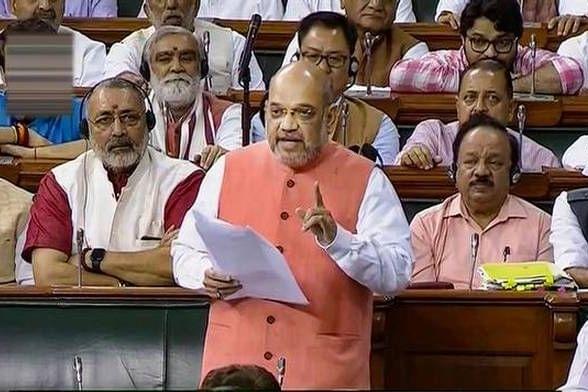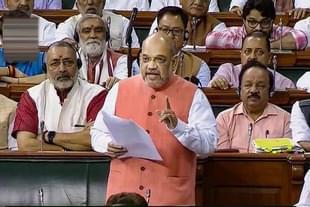Politics
CAB Is A Belated Attempt By Indian Government To Extend Basic Human Dignity To Hindus Of Former East Pakistan
Sudipto Das
Dec 13, 2019, 01:01 PM | Updated 12:58 PM IST
Save & read from anywhere!
Bookmark stories for easy access on any device or the Swarajya app.


The Citizenship Amendment Bill (CAB) 2019 was passed by the Indian Parliament after a prolonged debate and vitriolic criticism by the opposition and sections of media and intelligentsia, accusing the government of murdering secularism at the altar of democracy.
In so many narratives from the either side — the government along with the supporters and the oppositions along with the opponents of such a move — one very simple fact is being totally ignored.
Though the names of Pakistan and Afghanistan have been taken along with that of Bangladesh, as the possible sources of the illegal immigrants, some basic fact-check and recalling of deliberately forgotten not-so-old history could reveal that the bulk of this illegal immigrants are Hindus from East Pakistan and Bangladesh. They shouldn’t be called ‘illegal’ in the first place.
West Bengal had a population of 21.2 million, of whom only 5.3 million or roughly 25 per cent were Muslim minorities, whereas East Bengal had 39.1 million people, of whom a staggering 11.4 million or roughly 30 per cent were predominantly Hindu minorities.
Presently, only 8 per cent of East Bengal, now Bangladesh, is Hindu, whereas West Bengal is 27 per cent Muslim, compared to 25 per cent at the time of Partition.
Anything between 7 million to 8 million of the 11.4 million Hindus were forced to flee East Bengal or East Pakistan and seek refuge in West Bengal and other parts of India, over the years, in a staggered way. During those days there was formidable resistance even from the newly-formed India government in accepting them, or even acknowledging their status as displaced people, forget settling them respectfully.
Exactly a year before the Partition of India, Mohammad Ali Jinnah had declared the Direct Action Day on 16 August 1946, resulting in ‘The Great Calcutta Killing’. That was the beginning of the Hindu genocide in Bengal, the mother of all communal riots in India, setting off an unending fission chain reaction of killings and destructions.
By the time the Partition happened in 1947, the 11.4 million Hindus in East Bengal realised that they wouldn’t be safe, for sure, in what had become East Pakistan.
Unlike Punjab, here it was not possible for such a huge population to flee East Bengal overnight.
As they trickled into India slowly, over the years, carrying with them never-heard-of horrific stories of one-sided Hindu genocide of massive proportions, Jawaharlal Nehru, the then prime minister, came up with an ill-conceived idea, much to the protests of people like Shyama Prasad Mukherjee, the founder of the organisation which eventually evolved into the present Bharatiya Janata Party (BJP).
To prevent the Hindu exodus from East Bengal, Nehru entered into a pact with the government of East Pakistan to help create favourable conditions for the post 1950 Hindu refugees to go back to their original homes in East Bengal. It’s really surprising that such a plan was never implemented in Punjab.
That’s not the end of the story.
In Pakistan, the condition of the Hindus deteriorated drastically. They were always looked at with suspicion, as though they were all Indian agents. A theft of a holy relic from the Hazratbal shrine in Srinagar led to killings of Hindus in 1963.
Hindu genocide, on any pretext, continued for years. It culminated in 1971 during the Bangladesh war of liberation when around 2.5 million Hindus were killed by the Pakistan Army. Compare that with the 5 million to 6 million Jews killed in Holocaust.
It was expected that Bangladesh, the country which was created on linguistic lines, would turn out to be secular. But, sadly enough, atrocities against the Hindus recurred numerous times after 1971, driven by Islamist groups.
Hence the Hindus from there have been trickling into India continuously, over the years, till this day, being constantly under the threat of violence and genocide. They were always unwanted and never accepted properly, or rather legally, by the Indian government.
Moreover, many had been sent back at the behest of Nehru, with the false assurance that they would be safe in their ancestral land. That never happened.
So, the bulk of the ‘illegal immigrants’ we are talking about are none but those Hindus from East Bengal who couldn’t enter India immediately after the Partition, and were forced to stay back in a hostile land. They faced severe persecution in years to come, and the ones who survived took desperate attempts at entering India again and again.
If all, who crossed the borders in 1947 and took refuge in India, could be considered legal citizens, why should the Hindus from East Bengal, who were not allowed to settle in India at that time, become ‘illegal immigrants’?
Had Nehru not been a ‘fanatic apostle’ of secularism, the situation in Bengal would have been the same as that in Punjab — everyone would have crossed the border in 1947, and there wouldn’t be this problem of ‘illegal immigrants’ now.
So, if seen closely, the amendment of the citizenship bill is nothing but predominantly a much belated attempt by the Indian government to provide a safe home to the Hindus of East Bengal whose ancestors, just a generation back, were denied their rights and were left to their own fates to fend for themselves.
I don’t think there is any accurate figure for their numbers, and for that matter, for the others like them who had to flee Pakistan or Afghanistan, but it wouldn’t be a wrong estimate to put the former much above the others.
Given this background, should we still ask why the non-Muslims are being considered now for an exemption?
I would say, it’s not an exemption anyway. It’s delivering them their rights, though much belated.
Sudipto Das, an IIT alumnus, is an author, musician and columnist. His debut novel The Ekkos Clan published in 2013. Trained in western classical music, he is the founding member of a music band Kohal. During the day, he works as the VP Engineering in a semiconductor firm in Bangalore.





